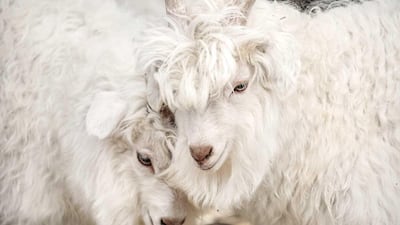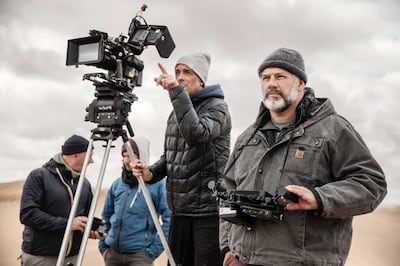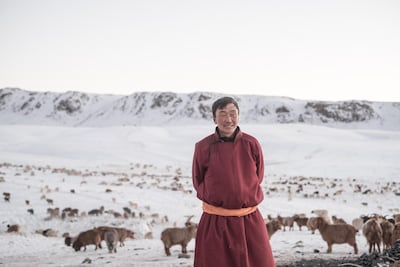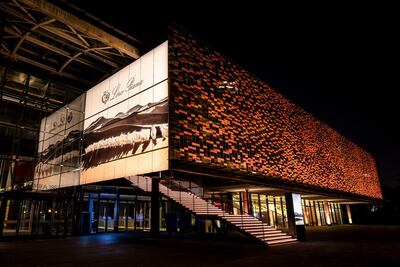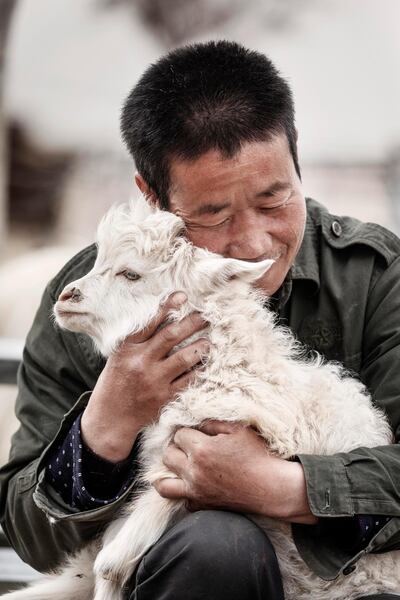“I trust you. I trust your sensitivity. I trust your power of creativity.”
This is Oscar-winning director Luc Jacquet's message to viewers of his latest film, Cashmere: The Origin of a Secret. Created in collaboration with luxury fashion brand Loro Piana, the 20-minute documentary premiered at the MIFA 1862 Art Centre in Shanghai last month, presenting a powerful glimpse into the lives of goat herders – and their flocks – in Mongolia and Inner Mongolia. It is an ode to the men, women and animals that are collectively responsible for supplying the world-class cashmere that Loro Piana is famous for.

'You cannot draw a boundary between the man and the animal'
The extreme temperatures and remote, expansive landscapes astound: snow-covered peaks, icy plains, jagged cliffs and rolling desert dunes.
The life cycle of the goats, dispensers of some of the finest and rarest natural fibres on the planet, is relayed in sometimes-graphic detail. And the music, performed live for the premiere by a 33-piece orchestra, is soaring and stirring. But it is the connection between man, animal and the environment – an intensely symbiotic relationship that is captured with obvious tenderness by Jacquet – that is the true protagonist of this film.
We see a weather-beaten herder gently cradling a young goat; small children hand-feeding baby animals from oversized milk bottles; and a woman emerging from her makeshift shelter, a bowl and ladle in hand, to throw spoonfuls of milk into the air as an offering to Mother Nature.
"For me, you cannot draw a boundary between the man and the animal, because when they are living in such remote places, they learn to survive together. They have co-evolved. It was very important for me to show that," explains Jacquet, whose feature-length nature documentary March of the Penguins earned him an Academy Award in 2006. "These people are living every day of the year outside. They have a very precise sensitivity about everything in nature. The singing of birds, the flowers, and so on. We are not sensitive to these kinds of signals any more."
Jacquet demands sensitivity from his audience, which is one reason he purposefully refrained from including any form of narration in Cashmere: The Origin of a Secret. "It makes you lazy," he maintains. "For me, telling a story without telling the story is a way to use the language of cinema to encourage people to use their own creativity. I think this is more powerful. I don't think you need subtitles to understand what is being said in this film. You must trust what you are seeing. Nowadays, because of the way TV is, we are always overloaded and things are over-explained. But people are not stupid."
'We are dealing with the gift of nature'
And so audiences are invited to immerse themselves in the harsh nomadic lifestyle of herders that exist in some of the most extreme parts of the planet – but produce one of the most luxurious materials known to man. This is one of many paradoxes that the film exposes. “There is an almost strange contrast in the fact that somehow the particular softness of cashmere is due to the very severe and tough weather conditions; the more severe the weather, the softer the fibre,” says Fabio d’Angelantonio, Loro Piana’s chief executive.
The animals’ outer coat shields against rain, sun and dust, but beneath lies a soft underfleece that acts as a layer of insulation. This is the cashmere. Every spring, goat herders harvest this by gently combing the goat, with no harm caused to the animal. The process is studiously documented in Jacquet’s film – balls of cashmere painstakingly extracted and rolled into frothy bundles that will be transformed into designer coats, scarves, jackets and jumpers. A single goat will yield no more than 150 grams of the precious raw material each year.
"We have the privilege and the responsibility of dealing with the gift of nature," d'Angelantonio explains. "At the heart of our products, there are natural fibres. For us, and I think it's something that as a company we have cultivated over generations, it is about generating relationships, going around the world, understanding, searching, sourcing and working hand in hand with breeders, growers and farmers, in order to reach a certain quality and reach it in a sustainable way."
The herders themselves sit in the front row at the premiere, adorned in colourful native dress and smiling broadly. If they are perplexed as to why their everyday existence would be of such interest to this well-heeled congregation of international press, Chinese movie stars and Shanghai glitterati, they don't let on. "We were very concerned about their reaction," Jacquet admits. "When you are filming someone, when you are consuming their time, you are responsible to them. I felt they were quite happy, and this is very important… [I wanted] to show them that their normal life can be something very spectacular to other people.
“The connection with these people was so intense, because we were with them all the time. We started to build something very real. After the shooting, they gave me a camel. For me, it was proof that we had a very special connection. Proof that probably I behaved in the right way with them. I feel very very lucky to have been a part of this family for a while.”
'You can make money... and you can be sustainable'
Over the past decade, there has been a significant increase in demand for cashmere from fast fashion companies, leading to a proliferation of goat herds, which has, in turn, put a strain on the land and led to the desertification of certain areas. In partnership with the University of Camerino and the Jilin Agricultural University, the Loro Piana Method was developed and introduced in Inner Mongolia in 2009 to counter this. "We created a certain number of practices that help normal growers to improve progressively the quality of the fibres obtained from the flock, and on the other side, we give them a good motivation, because we are able and willing to pay a premium price for improved quality. They can obtain similar or improved economic sustainment with a smaller flock, but are able to produce better quality. All this makes the entire cycle sustainable for the region and for nature," says d'Angelantonio.
It was an inherent sustainability, built into the company's DNA by default rather than design, that persuaded Jacquet to work with Loro Piana, he says. Cashmere is the first film in a trilogy that will also explore the origins of vicuna and Merrino wool. "When I met with Loro Piana for the first time, it was very interesting for me, because they were sustainable, without being sustainable – which means that, for them, being sustainable was pure economic realism. For me, it was an example to show. You can make money and you can be successful in an economic model and you can be sustainable."
Sophokles Tasioulis has spent 20 years producing films, specialising in natural history productions intended for the big screen. In 2018, he teamed up with Jacquet to establish Icebreaker Nature Entertainment Studios and, over a Skype call from his base in Berlin, he explains the importance – and potential pitfalls – of teaming up with big, international brands such as Loro Piana to create wildlife documentaries.
'Movies are a very good device to trigger change'
“Movies are a very good device to trigger change. Politicians, or the United Nations, may talk about saving the planet, but it’s very technical and it’s very far away from normal people. Change will not start in the head; change will start in the heart. And that’s what we do,” Tasioulis explains. “We make beautiful images that create an emotional bond between the audience and what it sees.
"But we need to have partners, and one of the ways is to work with big multinational brands. This has to be done very carefully because obviously we are a target for greenwashing. It took us 20 or 25 years to build our reputations – and it takes one day to destroy them. Therefore, when we do this, we are very careful [who we work with]. Loro Piana was an interesting one for us because this is a brand where sustainability is part of their economic model. They haven't jumped on the bandwagon now because being green or being sustainable is en vogue.
“Luc didn’t want to do a commercial,” Tasioulis continues. “He didn’t want to put his name on something that just promoted a product. But he talked to the Loro Piana people and they told him: ‘You can do what you want, we don’t want any product placement in there. Just show where our fibres are coming from.’ That’s a daring decision for a brand.”
And so, the origins of cashmere are unveiled, one beautiful frame at a time – and audiences are invited to consider where their luxury purchases come from, but also to marvel at the ingenuity and tenacity of man, and the generosity of Mother Nature.
Jacquet sums it up in a speech after the premiere: "When you understand that nature gives this gift, and that the power and patience of man gives this gift, maybe you'll consider cashmere in a very different way… I think we will have a future on this planet if we are connected to this planet, emotionally. If this film can help people to see we are living in a very precious world, maybe I will have achieved my goal."
